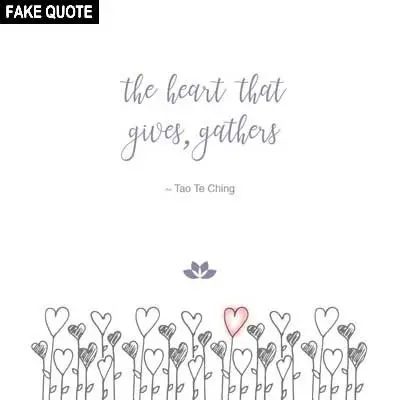|
Tao Te Ching
THE TAOISM OF LAO TZU
|
Fake Lao Tzu Quote"The heart that gives..."
This is NOT a quote from Tao Te Ching:"The heart that gives, gathers."
The heart as a symbol is in Chinese tradition not the same as it is in the West. We connect it to love and other emotions, whereas the Chinese concept stands for the mind and the will. Lao Tzu also used the word with that connotation several times in Tao Te Ching, for example in chapter 8 (my version):
It is also a strange saying. A heart that is giving and gathering is an odd organ, even if it is to be understood symbolically. It would make more sense to say, for example, that a heart finding joy in giving will be pleased by getting. The heart is not doing the job, though it might be the motivator. Who can be doing the actual giving and gathering, then? The hand, of course. And there is a saying that must be the original form of the quote discussed here:
So, that wording has been with us for long, whereas the version with "heart" is much more recent. The earliest occurrence I have found of the "heart" version in print is International Stereotypers' and Electrotypers' Union Journal, volume 54, from 1959, calling it an old English proverb (page 66). That indicates it was the Howell source misread. It appeared again in 1964, in Old Lamps and New, by Ruth Little (page 9), saying nothing about the origin. Little is sometimes accredited with the saying on the web. The first books ascribing the quote to Lao Tzu are from 2020, but it happened earlier on the Internet. A web page listing "Great Quotes for Nurses" on May 13, 2013, is the earliest I have found with the quote, stating that it is from Tao Te Ching. In November 2016, Richard Branson had the quote in his column at Virgin, also claiming it to be from Tao Te Ching (the blog post now seems to be gone, but it is saved at Internet Archive). That probably helped to spread the misconception. Another Richard Branson quote of Lao Tzu is discussed in the chapter Leadership is the ability... As for memes on the web, the ones with this quote seem to be rather equally divided between ascribing Lao Tzu and Marianne Moore. The Goodreads website has the quote twice, ascribing it to Lao Tzu and Marianne Moore respectively. The former got its first like in 2014 and the latter as early as 2008, which was the year after the website launched. I would put my bet on the quote originating with Howell's Paroimiographia and then misquoted with "heart" instead of "hand," much later to be ascribed to Lao Tzu, since the proverb was anonymous to begin with. I still have to figure out how it got ascribed to both Hannah and Marianne Moore. My guess would be that it started with Hannah as several older books indicate, though I don't know how, and then someone got the wrong Moore for it.
Stefan Stenudd September 20, 2020.
More Fake Lao Tzu QuotesThere are many more fake Lao Tzu quotes examined on this website. Click the header to see a list of them.
Fake interview with the authorClick the header to read a "fake" interview with Stefan Stenudd, the author of Fake Lao Tzu Quotes.
About CookiesMy Other Websites:I Ching OnlineThe 64 hexagrams of the Chinese classic I Ching and what they mean in divination. Try it online for free.
Qi Energy ExercisesThe ancient Chinese life energy qi (chi) explained, with simple instructions on how to exercise it.
Life EnergyThe many ancient and modern life force beliefs all over the world explained and compared.
Taoismen på svenska
Other Books by Stefan StenuddClick the image to see the book at Amazon (paid link).
The Greek philosophers and what they thought about cosmology, myth, and the gods. |
 Tao Te Ching
Tao Te Ching Now it's a book, too!
Now it's a book, too! Tao Quotes
Tao Quotes Cosmos of the Ancients
Cosmos of the Ancients Qi — Increase Your Life Energy
Qi — Increase Your Life Energy Aikido Principles
Aikido Principles Life Energy Encyclopedia
Life Energy Encyclopedia Archetypes of Mythology
Archetypes of Mythology Stefan Stenudd
Stefan Stenudd